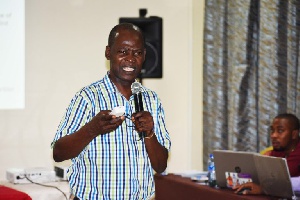Dr. Steve Manteaw of the Civil Society Platform on Oil and Gas has kicked against attempts by government to establish a fertiliser plant, saying it would be economically unwise to do so.
He observed that even the recommendations of the primary document on the gas sector – the ‘Gas Master Plan’ – evidently discourages the creation of a fertiliser production plant, seen as a high-risk option due to its high capital investment requirements, among others.
Given the economies of scale, the uncompetitive gas prices locally, and stiff competition from some North African countries who are into the production of fertiliser, he emphatically noted that it would be ill-advised for government to undertake this venture.
According to the Gas Master Plan, the requirement for low gas prices and a strong level of competition in globalised markets with volatile prices makes such a strategic capital-intensive industry a high-risk option.
The recommended strategy for gas utilisation rather prioritises the use of gas for power generation, which it said is one of the most economically attractive, low-risk and urgent demand sectors for natural gas supplies.
It also recommends cement or clinker production, which represents an economic sector for the use of gas – subject to availability of suitable limestone deposits, among others.
Dr. Manteaw, who is also a member of the Public Interest and Accountability Committee (PIAC), was speaking at a forum for journalists as part of the ‘Power Reporting’ series organised by Penplusbytes, with support from GOGIG. He emphasised that exploitation of the gas comes with a clear vision of driving the country’s industrialisation efforts.
Against this backdrop, he said, any such decision outside the policy document’s recommendations on the sector could be costly for the economy.
He therefore cautioned against the slow pace of operationising the Gas Master Plan, as well as the failure to fully engage the public, media and other stakeholders such as the AGI, Chamber of Commerce among others, on the document.
His remarks follow indications from sources that the Ghana National Gas Company (GNGC) is considering the possibility of setting up a fertiliser plant.
Among other suggestions to develop the sector, he said: “We must begin to engage stakeholders on the GMP to re-orient their investment and planning decisions.
“There is a need to ensure that the errors committed in developing the gas infrastructure, and through which Ghana lost money, do not re-occur.”
He reiterated that transparency, accountability, and citizens’ participation remain key to achieving greater and lasting economic value in Ghana’s hydrocarbon sector.
According to PIAC’s 2017 Semi-Annual Report, raw gas produced from the Jubilee, TEN and SGN Fields in the first half of 2017 totalled 31,673.96 Million Standard Cubic Feet (MMScf).
A combined gas volume of 11,095.71 MMScf was exported to GNGC while a total of 238.39 MMScf of raw gas, exported from the TEN Field to GNGC, was used as a gas export trial after the TEN gas manifold was installed and commissioned.
PIAC recommends that the relationship between GNPC and GNGC should be clearly delineated. This is because “there appears to be an ownership conflict between these two institutions, which does not augur well for development of the industry, or the State at large”.
Business News of Sunday, 4 February 2018
Source: thebftonline.com













